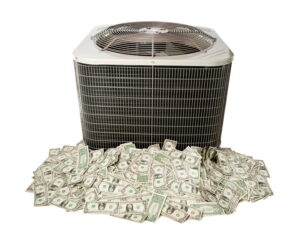A great air conditioning system does more than keep your house cool. It keeps your house cool without wasting energy. In other words, it runs efficiently.
But the same way that an AC can start to decline and provide less cool air, it can also start to become inefficient and waste energy. The two don’t even have to go together: you might still enjoy ideal comfort from your air conditioner yet see a tremendous rise in utility bills. If you have a problem with an inefficient air conditioner, you may need AC repair in Macclenny, FL—or possibly a new air conditioner!
What are the most common causes of an inefficient air conditioner?
- Clogged air filter: Dirty filters reduce airflow, forcing the system to work harder and consume more energy.
- Poor installation: Incorrect ductwork, system sizing, or drainage can quietly reduce efficiency over time.
- Lack of maintenance: Skipping annual tune‑ups allows efficiency to decline year after year.
- Leaky or damaged ducts: Holes or sagging ducts can waste up to 30% of cooled air before it reaches your home.
- Refrigerant loss and dirty coils: Leaks and debris buildup on coils strain the compressor and reduce performance.
- Aging equipment: AC units over 15 years old lose efficiency and may need replacement.
We’ll look at six ways an AC can become inefficient.
#1. Clogged air filter
We put this one first because it’s common but also easily resolved. If you leave the air filter in the HVAC system in place for more than three months, it will clog up and force the blower fan to work harder to circulate air. Change the filter for a clean one, and keep up with changes every 1 to 3 months to prevent this in the future.
#2. Poor initial installation
We stress with customers that they must have licensed professionals install their air conditioning systems. A poor installation may disguise itself at first and appear to run fine. But errors in duct connections, the drainage system, and proper system sizing can lead to an inefficient AC in only a few years.
#3. Lack of maintenance
This is a problem that should be easy to avoid: just remember to have maintenance for your AC done each spring. We know, easier said than done! Enrolling in our maintenance plan makes it simpler to have this vital job done each year, and it makes a big difference. An AC will lose, on average 5% of its efficiency each year it misses maintenance. With maintenance, it will only lose around 5% of its efficiency over most of its service life.
#4. Leaking air ducts
The destroyer of your air conditioner’s efficiency may lurk in the ventilation system rather than the AC itself. As ducts age, they can sag and begin to weaken, leading to leaks developing. Air leaks in the ducts can account for losing up to 30% of the air moving through them, and that will cut massively into an air conditioner’s efficiency.
#5. Refrigerant loss (and other repair problems)
This is a catch-all category because numerous malfunctions in an air conditioner can cause efficiency drops. Leaking refrigerant, dirty motors, dirty condenser or evaporator coils, a hard-starting compressor, even a faulty thermostat or similar issue. Always move fast to have repairs done, because even if the AC is still running, it will cost more to operate.
#6. Age
If your air conditioner is more than 15 years old, age will catch up with it and cause an efficiency decline. Maintenance and repairs won’t do much good at this point. When you’ve got an old AC that costs too much to run, it’s time to consider a full AC replacement.
Frequently Asked Questions
Question: What clogs most cause an AC to become inefficient?
Answer: The most common culprit is a clogged air filter. When filters aren’t replaced every 1–3 months, airflow is restricted, making the blower work harder and wasting energy.
Question: How can poor installation affect AC efficiency?
Answer: An improperly installed system, whether duct connections, drain lines, or incorrect sizing, can run efficiently at first but decline over time, raising energy use and reducing comfort.
Question: Why does skipping maintenance reduce AC efficiency?
Answer: Neglecting annual inspections leads to gradual efficiency loss, on average about 5% per year, due to dirty coils, loose parts, and undetected small issues that build up over time.
Question: How do dirty coils impact cooling performance?
Answer: Dirt-covered evaporator or condenser coils lose their ability to transfer heat effectively, forcing your AC to work longer and harder, increasing operating costs and wear.
Question: Can closing vents indoors actually waste energy?
Answer: Yes. Blocking room vents restricts airflow balance, increases duct pressure, and causes the system to run inefficiently, often raising energy use and reducing cooling effectiveness.
Call Touchstone Heating and Air Inc 24/7 for exceptional customer service! We’ve served the communities of North Central Florida since 1998.

